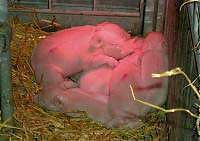The Italian researchers who produced the first horse clone have announced the birth of 14 cloned piglets.
Prof Cesare Galli, at the Laboratory of Reproductive Technology in Cremona, said the pigs would help in understanding animal to human organ transplants. The pigs could be used as a model for transplantation research because they are close to the human in terms of anatomy and physiology.
Scientists have now cloned sheep, mice, cattle, goats, rabbits, cats, pigs, mules and dogs.

Unlike Prometea and Galileo (the horse and bull previously cloned at the Lab), the piglets don’t have a name. “There are too many of them,” explained Galli. “We use numbers to call them.”
Via La Repubblica and BBC News.
Meanwhile…
British scientists are genetically engineering chickens to protect them against the avian influenza that has devastated poultry farms in the Far East, with a view to replacing stocks with birds that are not susceptible to influenza.
The team, led by Laurence Tiley, of Cambridge University, and Helen Sang, of the Roslin Institute has already shown that chicken cells can be protected against flu by inserting small pieces of genetic material.
Even if the technique works, it will be several years before it can be used to stock farms and it also faces regulatory hurdles and a battle to win over public opinion. “Once we have regulatory approval, we believe it will only take between four and five years to breed enough chickens to replace the entire world population,” Professor Tiley said.
Via The Times.
